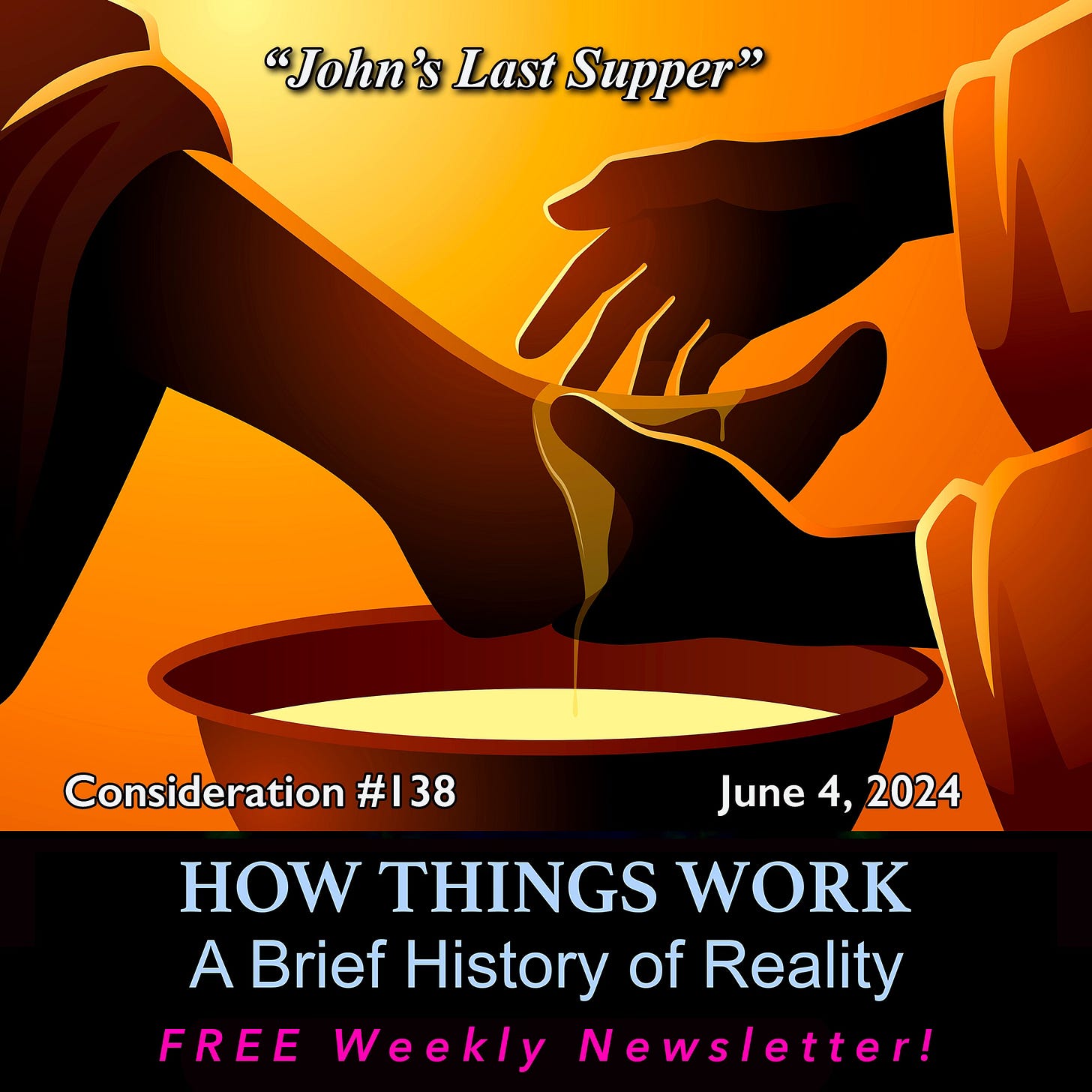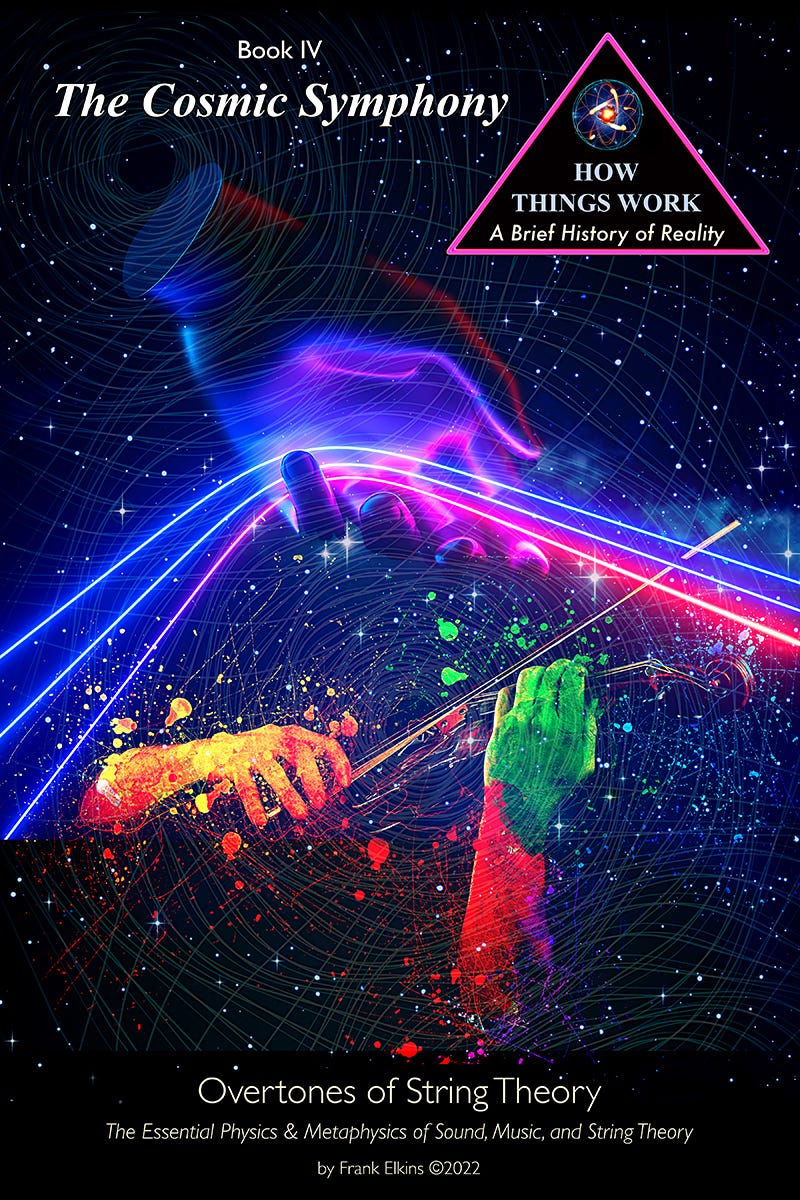John's Last Supper
HOW THINGS WORK – Consideration #138 (Book II Science & Religion)
Be A Part of the Conversation!
Tuesday June 4, 2024
“Jesus gave us a model for the work of the church at the Last Supper. While his disciples kept proposing more organization - Hey, let's elect officers, establish hierarchy, set standards of professionalism - Jesus quietly picked up a towel and basin of water and began to wash their feet.”
– Philip Yancey
PREFACE
Welcome Everybody!
After upsetting the Jewish authorities as a result of raising Lazarus from the dead, Jesus does eventually returns to Jerusalem to celebrate the Passover and the Last Supper with his disciples, just as in the other gospels. However, John shares a very personal incident not recorded in the synoptic gospels. Here, Jesus clearly demonstrates the essence of his message by becoming a literal role model for that message: service to others.
“In John’s gospel the devil is directly responsible for Judas betraying Jesus…”
John’s gospel reflects Jesus’ concern over what will happen to his disciples after his death, which is why he is so explicit about things. He needs to be sure they understand. In John’s gospel the devil is directly responsible for Judas betraying Jesus, once again making it part of a “spiritual plan” as opposed to one individual’s decision.
It was just before the Passover Festival. Jesus knew that the hour had come for him to leave this world and go to the Father. Having loved his own who were in the world, he loved them to the end.
The evening meal was in progress, and the devil had already prompted Judas, the son of Simon Iscariot, to betray Jesus. Jesus knew that the Father had put all things under his power, and that he had come from God and was returning to God; so he got up from the meal, took off his outer clothing, and wrapped a towel around his waist. After that, he poured water into a basin and began to wash his disciples’ feet, drying them with the towel that was wrapped around him.
John 13:1-5
At this point Peter objects to being served by Jesus, however after Jesus explains the necessity of this action Peter not only capitulates, but as is characteristic of his personality, requests that Jesus should wash his hands and head as well. Jesus reassures Peter that his feet are enough while explaining the nature of “being clean.”
He came to Simon Peter, who said to him, “Lord, are you going to wash my feet?”
Jesus replied, “You do not realize now what I am doing, but later you will understand.”
“No,” said Peter, “you shall never wash my feet.”
Jesus answered, “Unless I wash you, you have no part with me.”
“Then, Lord,” Simon Peter replied, “not just my feet but my hands and my head as well!”
John 13:6-9
Jesus reassures Peter that his feet are enough while explaining the nature of “being clean.” His recognition that not everyone is clean alludes to the evil that had possessed Judas. Jesus “double checks” to make sure that the apostles understand the significance of his actions. Then once again clearly explains it to them to “make sure” they fully understand the metaphor behind the message.
Jesus answered, “Those who have had a bath need only to wash their feet; their whole body is clean. And you are clean, though not every one of you.” For he knew who was going to betray him, and that was why he said not every one was clean.
When he had finished washing their feet, he put on his clothes and returned to his place. “Do you understand what I have done for you?” he asked them. “You call me ‘Teacher’ and ‘Lord,’ and rightly so, for that is what I am. Now that I, your Lord and Teacher, have washed your feet, you also should wash one another’s feet. I have set you an example that you should do as I have done for you. Very truly I tell you, no servant is greater than his master, nor is a messenger greater than the one who sent him. Now that you know these things, you will be blessed if you do them.
John 13:10-17
Jesus not only demonstrates humility by humbling himself before his disciples, but he also displays a deep love and compassion for them in his attempt to comfort them about what is about to take place. He worries about how they will handle his arrest and crucifixion, and urgently attempts to prepare them for the inevitable.
CONSIDERATION #138 – John’s Last Supper
In John, Jesus shows great love for those who follow him, even though they often misunderstand him. He assures them he is not leaving them, but preparing a new place for them, in God’s Kingdom.
“Do not let your hearts be troubled. You believe in God; believe also in me. My Father’s house has many rooms; if that were not so, would I have told you that I am going there to prepare a place for you? And if I go and prepare a place for you, I will come back and take you to be with me that you also may be where I am. You know the way to the place where I am going.”
John 14:1-4
In this metaphor regarding the Kingdom of Heaven, Jesus suggests there are alternative rational realities to empirical reality that do exist; which is directly connected to the possibility of resurrection. However, even in the midst of being comforted by Jesus, Thomas continues to have doubts. Once again, Jesus directly and specifically explains the bedrock foundation of his message; recognition and faith.
Thomas said to him, “Lord, we don’t know where you are going, so how can we know the way?”
Jesus answered, “I am the way and the truth and the life. No one comes to the Father except through me. If you really know me, you will know my Father as well. From now on, you do know him and have seen him.”
Philip said, “Lord, show us the Father and that will be enough for us.”
Jesus answered: “Don’t you know me, Philip, even after I have been among you such a long time? Anyone who has seen me has seen the Father. How can you say, ‘Show us the Father’?
Don’t you believe that I am in the Father, and that the Father is in me? The words I say to you I do not speak on my own authority. Rather, it is the Father, living in me, who is doing his work. Believe me when I say that I am in the Father and the Father is in me; or at least believe on the evidence of the works themselves. Very truly I tell you, whoever believes in me will do the works I have been doing, and they will do even greater things than these, because I am going to the Father. And I will do whatever you ask in my name, so that the Father may be glorified in the Son. You may ask me for anything in my name, and I will do it.
John 14:5-14
Jesus reassures them that the grief they will feel at his loss is a necessary part of this process; like the pain of a woman giving birth. He reminds them that once the wonder of birth occurs, the remembrance of the pain disappears. Pain is replaced with joy and love.
Jesus went on to say, “In a little while you will see me no more, and then after a little while you will see me.”
At this, some of his disciples said to one another, “What does he mean by saying, ‘In a little while you will see me no more, and then after a little while you will see me,’ and ‘Because I am going to the Father’?” They kept asking, “What does he mean by ‘a little while’? We don’t understand what he is saying.”
Jesus saw that they wanted to ask him about this, so he said to them, “Are you asking one another what I meant when I said, ‘In a little while you will see me no more, and then after a little while you will see me’? Very truly I tell you, you will weep and mourn while the world rejoices. You will grieve, but your grief will turn to joy. A woman giving birth to a child has pain because her time has come; but when her baby is born she forgets the anguish because of her joy that a child is born into the world. So with you: Now is your time of grief, but I will see you again and you will rejoice, and no one will take away your joy. In that day you will no longer ask me anything. Very truly I tell you, my Father will give you whatever you ask in my name. Until now you have not asked for anything in my name. Ask and you will receive, and your joy will be complete.
16:16-24
Jesus explains that soon he will provide them with a more direct experience of his message and that they will actually experience his understanding of God personally. However, he will have to die first.
“Though I have been speaking figuratively, a time is coming when I will no longer use this kind of language but will tell you plainly about my Father. In that day you will ask in my name. I am not saying that I will ask the Father on your behalf. No, the Father himself loves you because you have loved me and have believed that I came from God. I came from the Father and entered the world; now I am leaving the world and going back to the Father.”
John 16:25-28
His hour had come, and his main concern was for those he loved who would be left behind when he was gone; knowing they would not understand what was happening.
POSTSCRIPT
In John, Jesus fully explains what a good shepherd really is. A good shepherd cares about the welfare of his sheep and is willing to give up his life if needed to protect them. A good shepherd loves his sheep.
“I am the good shepherd. The good shepherd lays down his life for the sheep. The hired hand is not the shepherd and does not own the sheep. So when he sees the wolf coming, he abandons the sheep and runs away. Then the wolf attacks the flock and scatters it. The man runs away because he is a hired hand and cares nothing for the sheep.
John 10:11-13
Jesus also explains that he tends other sheep (non-Jewish sheep) as well, who he must also care for and protect. However, eventually there will be one single flock of sheep. The Father loves the good shepherd because he is willing to lay down his life for his sheep. However, in Jesus’ case, he will also take it up again.
“I am the good shepherd; I know my sheep and my sheep know me— just as the Father knows me and I know the Father—and I lay down my life for the sheep. I have other sheep that are not of this sheep pen. I must bring them also. They too will listen to my voice, and there shall be one flock and one shepherd. The reason my Father loves me is that I lay down my life—only to take it up again. No one takes it from me, but I lay it down of my own accord. I have authority to lay it down and authority to take it up again. This command I received from my Father.”
John 10:14-18
In true Biblical irony, soon, the shepherd would be offered as a sacrifice for the sake of the sheep. Next week we will consider John’s interpretation of the trial and execution of Jesus…
Expand the Conversation by Upgrading to “Reality by a Thread!”
Excerpt From This Week’s “Untangling the Knots of Reality” Podcast:
• UNTANGLING THE KNOTS OF REALITY: Podcast #98 – “Untangling the Mystery of Gravity”
“Why were classical physicists willing to ignore the problems with Newton’s theory of gravity?” “Why did Einstein decide to directly confront these problems?” “What was Newton’s most revolutionary insight about gravity?” “What was Einstein’s most revolutionary insight about Newton’s theory of gravity?” “What was the limitation in Newton’s mathematics discovered by Einstein that led to his General Theory of Relativity?” These are some of the knots we will attempt to untangle in this week’s podcast. That’s a lot of gravitational mystery for one podcast! So, let’s get started…
• REALITY BY A THREAD: “AI Axiom #6 (Excerpt) – This axiom goes to the very heart of “being” in terms of having a purpose. Artificial Intelligence must be more than just a source of advanced digital intelligence; it must have a purpose. A reason for “being.” That essential purpose should be to protect and advance life, including human life. Not as a part of its programing, training, or machine learning; but as a part of its essential reason for “being.”
•FREE PDF DOWNLOADS of Book IV: “The Cosmic Symphony – Overtones of String Theory” plus other Free Books, Discounts and Benefits. Also Gain Complete Access to all Previous Podcasts and Threads!
UPGRADE NOW!
Is Everything in the Universe Simply a Manifestation of Abstract Mathematical Vibrations?
“Music, like the universe itself, was not haphazard or chaotic like dissonant hammers banging on anvils. It was a mathematical puzzle of perfection waiting to be precisely manifested into physical reality through pure mathematical abstraction...”
Book IV – The Cosmic Symphony
“Because Pythagoras believed numbers constituted the foundation of reality, he recognized a unique pattern of vibrations that was essentially reflected throughout all of existence. For Pythagoras, music represented the blueprint for all reality.”
Book IV – The Cosmic Symphony (210 pages)
THE ESSENTIAL PHYSICS & METAPHYSICS OF SOUND, WESTERN MUSIC, & STRING THEORY!
• What is the "Music of the Spheres?"
• How did the Music of the Spheres Evolve into String Theory?
• How did Pythagoras Change our Perception of Reality?
• What did Pythagoras Discover About the Science of Sound and Music?
• What are the Metaphysics Behind the Structure of Western Music?
• What is the "Mozart Effect" and is it Real?
• What is the Numerical Mysticism underlying the Mathematical Relationships of Sound & Music?
• What is String Theory and What does it Mean?• Is Everything Really Composed of Extremely Small Vibrating Strings of Energy?
• Is Reality Ultimately a Cosmic Symphony Eternally Resonating the "Mind of God?"






